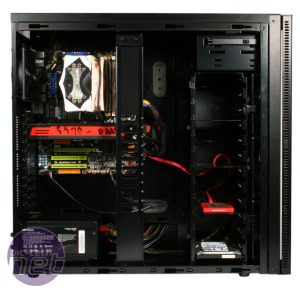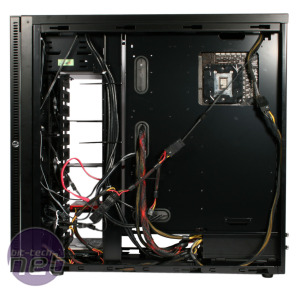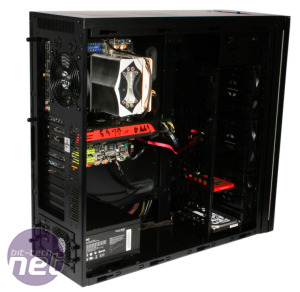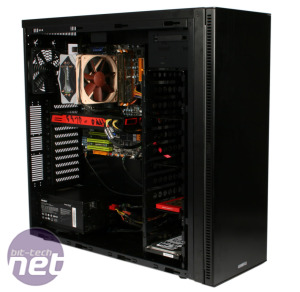
Performance Analysis
The PC-A76 managed a CPU delta T of 52˚C in our stress test, leaving it in the middle of the charts. This relatively average result was disappointing, as other similarly sized cases like the BitFenix Shinobi XL and the NZXT Switch 810 were both able to achieve lower temperatures while also retailing for less, and the NZXT Phantom 820 was able to match this result with its fans set to minimum speed. Having three intake fans is always helpful, but the distance the air has to cover and the fact that the airflow is blocked by both the front door and the drive cage reduces their impact.With no direct cooling for our graphics card, the GPU delta T of 51˚C was unsurprisingly quite bad, only matching that of the equally large Shinobi XL, which also suffered from the lack of a side intake fan.
The sealed nature of the PC-A76 did benefit it in terms of noise levels, and even with four case fans and our hardware under full load, it remained nice and quiet. We're sure some noise deadening foam would have improved matters even more in this arena, as some noise does still get out, but it's certainly one of the quieter cases we've had in the labs for a while.
Conclusion
There is sadly little with which to recommend the Lian Li PC-A76. The styling of Lian Li cases will always appeal to some, and the case does run quietly and is easy to build a system into. However, even though £165 may be relatively cheap for a fully aluminium Lian Li chassis, it's still a lot to pay for a good looking case with below average cooling, and no real stand out features. In many areas the build quality is also sub-par, and the lack of any sort of fan control is particularly irritating.Massive cases like the PC-A76 will always struggle to provide the air cooling performance of smaller cases where airflow is more concentrated, but a removable drive cage or a side fan would have improved matters considerably. While the NZXT Switch 810 and Xigmatek Elysium may not have the allure of the all-aluminium PC-A76, both have better features and do a better job for less money, and can each house a full size triple radiator without fuss, which the PC-A76 cannot, making them better suited to water cooling set ups too. NZXT's excellent Phantom 820 will set you back £35 more, which is admittedly no small sum, but it's also quiet, very well featured and dominates the PC-A76 in terms of water-cooling support as well.
-
Cooling13 / 30
-
Features16 / 20
-
Design24 / 30
-
Value15 / 20


MSI MPG Velox 100R Chassis Review
October 14 2021 | 15:04












Want to comment? Please log in.